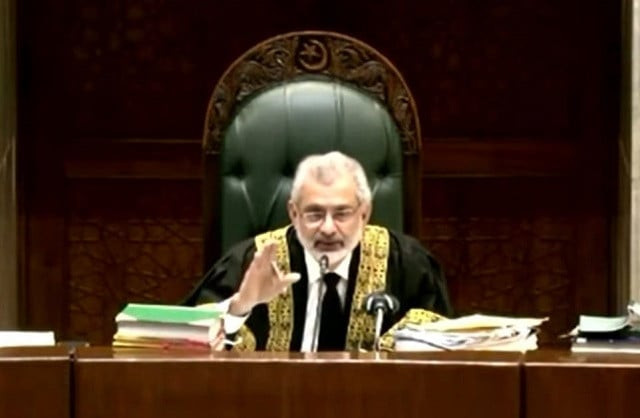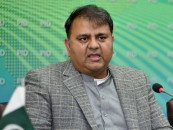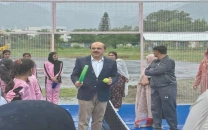If SIC controllers shift stance, you'll be left high and dry, CJP tells PTI
Chief justice Isa highlights contradictions in Sunni Ittehad Council’s legal arguments in reserved seats case

During the hearing of the Sunni Ittehad Council’s (SIC) reserved seats case, Chief Justice Qazi Faez Isa remarked, "In my view, your case would have been stronger if you had joined PTI after the elections. If those controlling the Sunni Ittehad Council change their mind tomorrow, you will be left with nothing."
The full court of 13 judges, including Justices Syed Mansoor Ali Shah, Munib Akhtar, Yahya Afridi, Aminuddin Khan, Mandokhail, Muhammad Ali Mazhar, Ayesha Malik, Athar Minallah, Syed Hasan Azhar Rizvi, Shahid Waheed, Irfan Saadat Khan, and Naeem Akhtar Afghan, convened for the live-streamed proceedings on the SC's website and YouTube channel.
The Sunni Ittehad Council’s lawyer, Faisal Siddiqi, argued that the court needs to interpret the Constitution progressively. "Justice Jamal Mandokhail has made a similar interpretation in a recent decision, stating that the Constitution is a living document, like a tree," Siddiqi said. In response, Chief Justice Isa asked, "What is written in the Constitution?"
Justice Ameenuddin Khan inquired about the procedure for a member joining political parties. Chief Justice Isa questioned, "Should we ignore the natural meaning of the Constitution? Why would we do that?"
Siddiqi emphasised the purpose of constitutional clauses. Justice Mandokhail remarked, "Why should seats be given to those who didn’t even contest the elections?"
Justice Irfan Saadat Khan commented, "Your arguments would render the words of the Constitution ineffective. Sunni Ittehad Council is not even a political party." Justice Athar Minallah added, "Even without an electoral symbol, it remains a listed political party, as recognised by the Election Commission."
Chief Justice Isa remarked, "If PTI still exists as a political party, why did its members join another party? If we accept your argument, joining another party would be like committing political suicide, which contradicts your own arguments."
Justice Shahid Waheed suggested reading sub-clause two of Rule 92 of the Election Commission. Justice Muneeb Akhtar noted, "The Election Commission declared these candidates as independents, but their opinion is not binding on us. Parliamentary democracy is built on political parties."
Justice Ameenuddin Khan pointed out that all candidates were from PTI, asking why certificates were returned if they were ideological. Siddiqi responded that special seats can only be allocated under the system of proportional representation, which is a right of political parties, not candidates.
Chief Justice Isa stated, "The court is bound by the words of the Constitution, not by interpretations of the Election Commission or yours."
Siddiqi asked if parties that did not participate in the elections could be granted reserved seats. Chief Justice Isa remarked, "Are you suggesting that the court should not interpret the words of the Constitution? The court must consider both the words and the purpose of the constitutional clauses."
Justice Mandokhail questioned, "How can reserved seats be given to parties that did not contest the elections?" Justice Ameenuddin Khan asked if independent members could form a new political party.
Siddiqi noted that if independents can register a political party within three days, they can certainly join one. Chief Justice Isa challenged, "Are you saying it’s unnecessary for a political party to secure a seat in elections?"
Justice Athar Minallah commented that the absence of an electoral symbol does not affect reserved seats. The Election Commission of Pakistan recognises both PTI and the Sunni Ittehad Council as registered parties. Chief Justice Isa asked why independents didn’t join PTI if it was a registered party, questioning if they committed political suicide by not joining.
Chief Justice Isa remarked, "Your arguments present a conflict of interest. Either represent Sunni Ittehad Council or PTI. We are only concerned with the Constitution, not the actions of the Election Commission."
Siddiqi said there are no choices for affected parties in this country. Chief Justice Isa responded, "Avoid political statements. Great judges in this country have refused to take an oath under PCO. Stick to the Constitution."
Siddiqi noted that the electoral symbol was taken away the night before. Chief Justice Isa asked, "What is the electoral symbol of Sunni Ittehad Council?" Siddiqi replied, "A horse."
Chief Justice Isa stated, "The electoral symbol of Sunni Ittehad Council was not taken away." Justice Mandokhail questioned why no appeal was filed against the Election Commission’s decision to declare candidates as independents. Siddiqi said Salman Akram Raja would answer that question. Chief Justice Isa asserted, "Rules cannot override the Constitution."
Siddiqi argued that parties not participating in elections should still be entitled to reserved seats. Chief Justice Isa reiterated, "The Constitution must be upheld, not individual interpretations."
Justice Mandokhail noted, "If PTI and Sunni Ittehad Council had merged, the issue might have been resolved, but it didn’t happen." Justice Hassan Azhar Rizvi asked if there were any objections from voters about joining Sunni Ittehad Council. Siddiqi said the only objections came from the Election Commission.
Chief Justice Isa reiterated that PTI attempted to postpone elections, and Imran Khan influenced the Election Commission.
The Supreme Court requested the nomination papers of Sunni Ittehad Council Chairman Hamid Raza and adjourned the hearing until 9:30am tomorrow.
Case background
Following the February 8 elections, where PTI-backed independent candidates joined SIC after the PTI lost its electoral symbol 'bat' due to a Supreme Court ruling.
The Election Commission of Pakistan (ECP) in a 4-1 verdict ruled in March that SIC could not claim reserved seats due to significant legal flaws and failure to submit a mandatory party list for such seats.
Consequently, the ECP redistributed these seats among other parliamentary parties, benefiting primarily PML-N and PPP with 16 and five additional seats respectively, while JUI-F received four seats. PTI rejected this verdict as unconstitutional.
In the same month, the Peshawar High Court dismissed an SIC plea challenging the ECP's decision to deny them reserved seats.
On May 6, a three-judge bench of the Supreme Court suspended the PHC verdict regarding the distribution of reserved seats beyond the originally allocated ones to political parties.
In line with the Supreme Court's directive, the ECP subsequently suspended the victory notifications of 77 lawmakers, resulting in the ruling coalition losing its two-thirds majority in the National Assembly.
At the end of May, a full court was convened to hear the case, with all judges present except Justice Musarrat Hilali.
During the June 3 hearing, Justice Mandokhail noted that the public had voted for PTI-nominated candidates rather than independents in the February 8 elections.
Justice Shah proposed that the controversy could be resolved if the ECP allowed former independent candidates three more days to decide whether to join another political party.
In subsequent hearings, the judges scrutinized the ECP's decisions and the January 13 Supreme Court verdict that deprived PTI of its 'bat' symbol.
Chief Justice Isa defended the January 13 verdict despite criticism from Justice Akhtar, who argued that the PTI lost its symbol due to a chain of errors triggered by the Supreme Court judgment.
The lawyers representing SIC and beneficiary parties like PPP and PML-N were granted two full days to conclude their arguments starting from the current hearing.
On Saturday, the ECP justified its decision to deny reserved seats to SIC for women and non-Muslims through a statement submitted by Senior Counsel Sikandar Bashir Mohmand to the Supreme Court.
The ECP argued that SIC did not qualify for reserved seats as it did not meet the constitutional criteria of being a political party under Articles 51(6)(d), 56(6)(e), and 106(3)(c) of the Constitution.
Additionally, SIC failed to submit a timely priority list (Form 66) for reserved seats as required by the election program.
The ECP also pointed out that Article 3 of SIC's constitution restricted party membership to adult Muslims only, which contradicted constitutional provisions on freedom of association, freedom to profess religion, and equality of citizens (Articles 17, 20, and 25).



















COMMENTS
Comments are moderated and generally will be posted if they are on-topic and not abusive.
For more information, please see our Comments FAQ